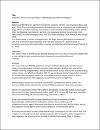Systematic Review on Drugs Effects on Bleeding Using Artificial Intelligence

View/
Date
2025Author
AlSahan, Omar S.Bashendy, Rana
Abu Ajiena, Shahed
Mohamed, Leena
Barsha, Fahimatun
Khalouf, Bayan
Hekmat, Mymuna
Bashar, Mohd Muhtasim
Mohamed, Ahmed
Bharde, Nishat
Aziz, Sara
Nogdalla, Sara Osman Ali
Mongid, Tala
Kharofa, Rawan
Abunada, Lina
Salih, Shiraz
Tammi, Faleh
...show more authors ...show less authors
Metadata
Show full item recordAbstract
Background: Bleeding is a significant concern for surgeons, dentists, and physicians (Abou Zeid et al., 2019). The increasing prescription of medications such as antiplatelet and antithrombotic drugs, which can affect bleeding, necessitates a comprehensive understanding of their effects. While the bleeding risks of aspirin, warfarin, and clopidogrel are well-documented, other medications, including antidepressants, may also impact bleeding (Teoh, Moses, & McCullough, 2020).
This review aimed to screen existing literature for drugs affecting bleeding and evaluate the role of AI in enhancing data extraction. Prior research indicates AI's ability to assist in systematic reviews by automating data screening and extraction with high accuracy (Tsafnat et al., 2014).
Objectives:
This review aimed to identify drugs affecting bleeding and assess the accuracy and validity of AI in automating the data extraction process compared to conventional manual
methods.
Methods:
The review followed PRSPIOR guidelines, using the PubMed database to identify relevant studies. Two independent reviewers screened titles, abstracts, and full texts, with a third reviewer resolving disagreements. Manual data extraction by four researchers focused on drug names, classes, and effects on bleeding. GPT-3.5 was employed by four independent reviewers for AI-based data extraction, which was cross-referenced with manual results to assess accuracy (false positives, false negatives, true positives, and true negatives).
Methodological quality was evaluated using SYRCLE's guidelines for animal studies, the Cochrane ROB2 tool for clinical trials, and the STROBE checklist for observational studies.
Results: This systematic review of drug effects on bleeding included 85 studies, comprising 49 observational studies, 9 experimental studies, and 27 RCTs. In total, 89 drugs were identified: 50 increased bleeding, 36 decreased bleeding, and 3 had no effect.
Drug classes associated with increased bleeding included thrombolytics, NSAIDs, glucocorticoids, antithrombotic medications, tyrosine kinase inhibitors, and analgesic/antipyretic agents. Decreased bleeding was associated with antifibrinolytic agents, anticoagulant reversal agents, proton pump inhibitors, and hemostatic agents.
AI-based data extraction correctly identified 68 drugs, achieving an accuracy rate of 76%. The comparison of AI and manual data extraction showed 39 true positives, 26 true negatives, 8 false negatives, and 1 false positive. AI failed to identify the bleeding effect in 12 cases.
Notable discrepancies occurred with a mineral supplement, where AI reported no effect while manual extraction indicated decreased bleeding, and with an antioxidative/anti-inflammatory drug, where AI found no effect, contrary to manual findings.
Conclusion:
This review highlights the importance of understanding drug effects on bleeding, which has critical implications for clinical practice and treatment planning. Drugs such as thrombolytics, NSAIDs, and antithrombotic medications were linked to increased bleeding risk, while antifibrinolytics and proton pump inhibitors decreased bleeding risk. The integration of AI into the systematic review process offers potential benefits by enhancing the efficiency of data extraction, though further refinement and validation are required to improve accuracy and decision-making.
DOI/handle
http://hdl.handle.net/10576/62628Collections
- The Scientific Research Theme [80 items ]

